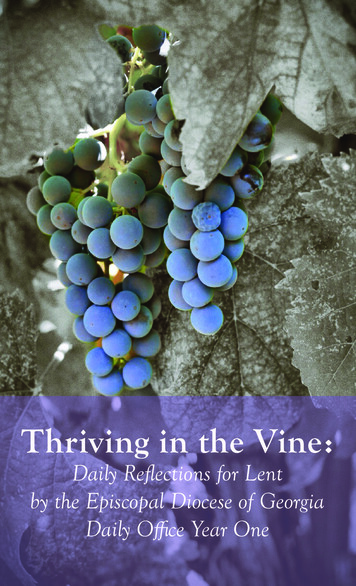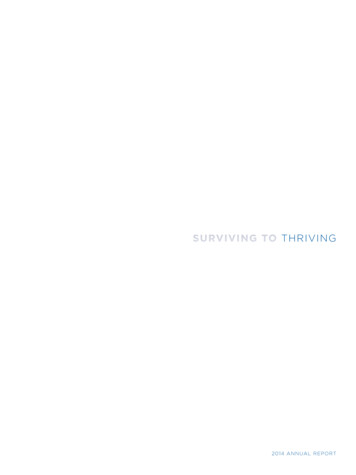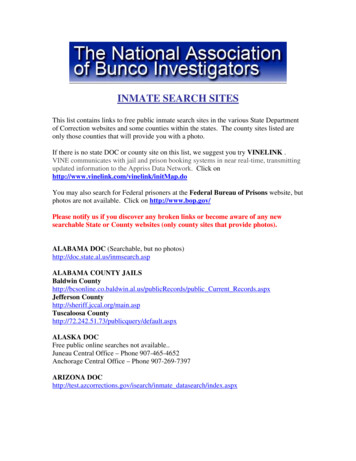
Transcription
Thriving in the Vine:Daily Reflections for Lentby the Episcopal Diocese of GeorgiaDaily Office Year One1
Daily Office Lectionary2Ash WednesdayIsaiah 58:1-12, 2 Cor. 5:20-6:10,Matt. 6:1-6, 16-21Thursday afterAsh WednesdayDeut. 7:6-11, Titus 1: 1-16,John 1:29-34Friday after AshWednesdayDeut. 7:12-16, Titus 2:1-15,John 1:35-42Saturday afterAsh WednesdayDeut. 7:17-26, Titus 3:1-15,John 1: 43-51First Sundayin LentDeut. 8:1-10, 1 Cor. 1:17-31,Mark 2:18-22First Mondayin LentDeut. 8:11-20, Heb. 2:11-18,John 2:1-12First Tuesdayin LentDeut. 9:4-12, Heb. 3:1-11,John 2:13-22FirstWednesdayin LentDeut. 9:13-21, Heb. 3:12-19,John 2:23-3:15First Thursdayin LentDeut. 9:23-10:5, Heb. 4:1-10,John 3:16-21First Fridayin LentDeut. 10:12-22, Heb. 4:11-16,John 3:22-36
First Saturdayin LentDeut. 11:18-28, Heb. 5:1-10,John 4:1-26Second Sundayin LentJer. 1:1-10, 1 Cor. 3:11-23,Mark 3:31-4:9Second Mondayin LentJer. 1:11-19, Rom. 1:1-15,John 4:27-42Second Tuesdayin LentJer. 2:1-13, Rom. 1:16-25,John 4:43-54SecondWednesdayin LentJer. 3:6-18, Rom. 1:28-2:11,John 5:1-18SecondThursdayin LentJer. 4:9-10, 19-28, Rom. 2:12-24,John 5:19-29Second Fridayin LentJer. 5:1-9, Rom. 2:25-3:18,John 5:30-47SecondSaturdayin LentJer. 5:20-31, Rom. 3:19-31,John 7:1-13Third Sundayin LentJer. 6:9-15, 1 Cor. 6:12-20,Mark 5:1-20Third Mondayin LentJer. 7:1-15, Rom. 4:1-12,John 7:14-363
4Third Tuesdayin LentJer. 7:21-34, Rom. 4:13-25,John 7:37-52ThirdWednesdayin LentJer. 8:18-9:6, Rom. 5:1-11,John 8:12-20Third Thursdayin LentJer. 10:11-24, Rom. 5:12-21,John 8:21-32Third Fridayin LentJer. 11:1-8, 14-20, Rom. 6:1-11,John 8:33-47Third Saturdayin LentJer. 13:1-11, Rom. 6:12-23,John 8:47-59Fourth Sundayin LentJer. 14:1-9, 17-22, Gal. 4:21-5:1,Mark 8:11-21Fourth Mondayin LentJer. 16:10-21, Rom. 7:1-12,John 6:1-15Fourth Tuesdayin LentJer. 17:19-27, Rom. 7:13-25,John 6:16-27FourthWednesdayin LentJer. 18:1-11, Rom. 8:1-11,John 6:27-40FourthThursdayin LentJer. 22:13-23, Rom. 8:12-27,John 6:41-51
Fourth Fridayin LentJer. 23:1-8, Rom. 8:28-39,John 6:52-59Fourth Saturdayin LentJer. 23:9-15, Rom. 9:1-18,John 6:60-71Fifth Sundayin LentJer. 23:16-32, 1 Cor. 9:19-27,Mark 8:31-9:1Fifth Mondayin LentJer. 24:1-10, Rom. 9:19-33,John 9:1-17Fifth Tuesdayin LentJer. 25:8-17, Rom. 10:1-13,John 9:18-41FifthWednesdayin LentJer. 25:30-38, Rom. 10:14-21,John 10:1-18Fifth Thursdayin LentJer. 26:1-16, Rom. 11:1-12,John 10:19-42Fifth Fridayin LentJer. 29:1, 4-13, Rom. 11:13-24,John 11:1-27, or 12:1-10Fifth Saturdayin LentJer. 31:27-34, Rom. 11:25-36,John 11:28-44, or 12:37-50Palm SundayZech. 9:9-12, Zech. 12:9-11,13:1, 7-9, 1 Tim. 6:12-16,Matt. 21:12-17Monday inHoly WeekJer. 12:1-16, Phil. 3:1-14,John 12:9-195
6Tuesday inHoly WeekJer. 15:10-21, Phil. 3:15-21,John 12:20-26Wednesday inHoly WeekJer. 17:5-10, 14-17, Phil. 4:1-13,John 12:27-36MaundyThursdayJer. 20:7-11, 1 Cor. 10:14-17;11:27-32, John 17:1-11(12-26)Good FridayWisdom 1:16-2:1, 12-22 orGen. 22:1-14 , 1 Peter 1:10-20,John 13:36-38, John 19:38-42Holy SaturdayJob 19:21-27a, Heb. 4:1-16,Rom. 8:1-11Easter DayPsalm 118:1-2, 14-24,Colossians 3:1-4, John 20:1-18
Introduction“Abide in me as I abide in you. Just as the branch cannotbear fruit by itself unless it abides in the vine, neithercan you unless you abide in me. I am the vine, you arethe branches. Those who abide in me and I in them bearmuch fruit, because apart from me you can do nothing.”John 15:4-5Jesus offers this teaching of a vine and branches on thenight before he died. He had already shared thePassover with the disciples. Jesus knew his followerswould soon scatter into the darkness out of fear whenthe arrest party arrived. And in those last minutesbefore his passion, he offered this image of the closestpossible connection, telling them that as part of theBody of Christ, we would be as connected to him asbranches are to the vine.He told the disciples to abide. That is not a word weuse anymore. Abide means to stay, remain, or rest. Thepassage could be translated remain with me and youwill bear fruit, but also rest in me and I will bear fruitthrough you.In a time when it is difficult to see or feel ourselves asthriving, the title of this devotional might ring false. Butno matter the season, we know that the only way we canthrive is not through our own resources, but bystaying connected to Jesus. It is in Jesus as the vine thatwe can find spiritual nourishment even in times thatseem barren.7
Resting in God this LentLent can seem like a time for doing. And that active wayof leaning into Lent is not only fine, but can be right,good, and joyful. I always find it awkward to discuss myown Lenten discipline as I don’t want to be holier thanthou. So my personal favorite answer when asked whatI am giving up for Lent is to say, “I am giving up eatingdesserts in front of other people.”Truthfully, Victoria and I usually give up eating meatin Lent, but more importantly, we also look for how wemight take on some spiritual discipline. After a year ofpandemic, we are not so ambitious. Resting in Jesus isenough for now. We do each have a Rule of Life, a listof our spiritual disciplines that we keep daily (such asscripture reading and prayer), weekly (gathering withothers for worship, even if online), and even annually(a retreat). But layering on more seems like it makesLent about what we do and this is a year for letting Godwork through us rather than trying to be superChristians. The one addition to our lives will be readingthis daily devotional with you and hearing the voices oflots of people all around the Diocese of Georgia.Even as we consider how to mark this season ofpreparation for Easter, we need to recall the grace that isours even in Lent. Whatever we do is not to get on God’sgood side, but to find ways to make ourselves more intune with that most important connection to the veryground of our being, the vine in whom we remain andrest.8
I am grateful that you are reading this introduction,ready to journey toward Easter together. I trust that Godwill show up through these daily reflections, offering aglimpse at how God is with us.Pax et Bonum, FrankBishop of Georgia9
Ash Wednesday“Very truly, I tell you, unless a grain of wheat falls intothe earth and dies, it remains just a single grain;but if it dies, it bears much fruit.”John 12:24These words spoken by Jesus are a wonderful imageof Lent for me. I can see myself as a seed in the darkdepths of the soil waiting for Easter when I can burstforth from the earth bearing the fruit of my Lentendisciplines.One of those Lenten disciplines is fasting. As aprofessed member of the Third Order, Society of SaintFrancis, I am required to fast (at a minimum) on AshWednesday and Good Friday.There are many definitions for “fasting”. Fromabstaining from food for the entire day to giving upmeat on Fridays in Lent. About a quarter of century ago,when Frank and I were much younger, we would beginour fast after our Mardi Gras pancake dinner and notbreak it until breakfast on Thursday morning. Age haschanged that! We now fast from Tuesday night untilsunset on Ash Wednesday when we eat a small meal,and we fast similarly on Good Friday.Fasting is a wonderful form of self-denial, but not allpeople can abstain for 24 hours from meals as somemedications must be taken with food. But, if you musteat, you can still fast by eating less or by not eating meator by giving up something else that is meaningful foryou.10
The Book of Common Prayer (BCP) recommendsfasting during the season of Lent, which should beobserved “by self-examination and repentance; byprayer, fasting, and self-denial; and by reading andmeditating on God’s Word” (BCP, p. 265). The BCP alsodesignates the weekdays of Lent and Holy Week and allFridays except in the seasons of Christmas and Easter asdays of “special devotion” with “special acts of disciplineand self-denial” (which normally include fasting)although an exception is made for the feast of theAnnunciation in Lent and feasts of our Lord on Friday.This year, in addition to fasting on Ash Wednesdayand Good Friday, Frank and I will fast on all Fridays inLent by skipping lunch and using that time to reflect onScripture. I look forward to Lent every year because Ifind all my Lenten practices, including fasting, nourishme in so very many ways.Also, fasting, along with other Lenten disciplines, suchas reflecting on the upcoming daily meditations in thisseries, make the celebration of Easter much moremeaningful.Victoria LogueThird Order, Society of St. Francis11
Thursday after Ash WednesdayYesterday was Ash Wednesday, a solemn day in whichChristians were marked with ashes and told in nouncertain terms, we are going to die. Welcome to Lent!Lent, in Christianity, is a period of penitentialpreparation for Easter.Lent begins with today’s text from John’s gospel, thefocus is on John the Baptist and his prophetic role inannouncing Jesus as the Promised Messiah. I would likefor you to reflect with me about the description Johnuses of Jesus as “the Lamb of God, who takes away thesin of the world!” (John 1:29).John invites us to behold the Lamb of God, and forthe next 40 days, we will hold two undeniable realitiesin tension, our mortality that leads to death and ourimmortality that leads to eternal life through the Lambof God.In purification rituals, lambs were commonly used inritual sacrifices and, when a lamb was specified, it was tobe a “lamb without blemish.” Sometimes a single lambwould be sacrificed; at other times, it could be as manyas twelve or more. Jesus would be the singleunblemished sacrifice to take away the sins of the wholeworld forever.As Christians, this is where we make the connectionbetween Jesus The Paschal Lamb whose blood was shedas an atonement for sin once and for all. And as Johnpoints out, “ not for ours only, but for the sins of thewhole world,” (1 John 2:2). With the words from the12
Ash Wednesday liturgy still ringing in our ears,“Remember you are dust and to dust you shall return,”today John points us to the Lamb of God where we havethe assurance of eternal life through faith in him.This is why whenever you see the Paschal Lambportrayed in religious art, it is never a young lambleaping in the meadow; but it is a mature lamb, standingerect with head held high, looking you in the eye,holding a staff by its right leg with a victory bannerwaving in the breeze. It is the Lamb of God who takesaway the sins of the world.Choristers will also recognize this same lamb in musicalsettings of the sung requiem. In the final movementbefore the closing Benediction is the Agnus Dei: “Lambof God, who takes away the sins of the world, havemercy upon us. Lamb of God grant us thy peace.” Themessage is clear: For us, the lamb comes to save us fromsin and death. In the end, the assurance of salvation isours, through faith in the Lamb of God. It is in dying toself that we are born again to eternal life.The Good News is that God has a plan for each of us, adestiny to fulfill. When John the Baptist saw Jesuscoming his way, he told his disciples, “Behold, the Lambof God, who takes away the sin of the world!” As youseek him in this COVID-19 wilderness these next 40days, dare to let the Lamb of God come more fully intoyour heart and invite others to know him. Welcome toLent!The Very Rev. Billy AlfordSt. Alban’s & Atonement, Augusta13
Friday after Ash WednesdayIn John’s Gospel, we begin the story of the disciples bylearning about the firsts – the first ones to follow Jesus. Ican’t imagine walking with the Messiah as He began hisministry, to trying to convince others that, yeah, this isthe guy. No, THE GUY!The first chapter of John soars through the celestialheights of the highest heavens, coming down to earthwith the introduction of John the Baptist, and soonafter, the calling of the twelve. By the time we meetthem, John the Baptist is already Jesus’ Number OneFan and uses the equivalent of a giant foam finger topoint out Jesus to Andrew and Simon as the Lord walksby. And here’s the thing – it doesn’t tell us that there’sa crowd following him. He seems to be walking alone,which makes what Andrew and Simon even moreastounding; they follow him.Being the first is a risk. John was already preachingabout the Messiah who was to come, and right beforethis, he even declared Jesus as the Son of God. His fateof becoming a disciple wasn’t a surprise or a risk to himand his livelihood. But Andrew and Simon Peter? Theyhad lives that hadn’t been devoted to the coming ofChrist. They weren’t obvious first recruits. I can imaginethem pacing around, asking each other if they madethe right decision, if giving up the life they had plannedwould be worth it.We’ve all been there – excited to jump into a newadventure, whether a project, a new career path, or anew relationship. But haven’t we all been scared, too?14
When the shine and initial excitement wears off, are westill brave? Are we still confident in our decision to stepout, to take that risk?Simon Peter and Andrew knew what they were doing,had to have known that to be the first wasn’t going tobe easy, that their lives had taken a change in direction.And yet, they stayed. Their faith guided their steps untilthe very end, inspiring others to follow.What risk are you taking? Where is your faith carryingyou this Lent?Liz WilliamsDiocese of Georgia Staff15
Saturday after Ash Wednesday“As the deer longs for the water-brooks,so longs my soul for you, O God.My soul is athirst for God, athirst for the living God;when shall I come to appear before thepresence of God?”Psalm 42:1-2There is a hunger in the human heart for a connectionto the creator who formed us in the very image andlikeness of God. In one of our Psalms for this evening,the Psalmist captures this longing as a thirst. In thesame way that we have to have water to survive, wethrive through staying grafted into the vine that is Jesus.Each Saturday in Lent, the reflections will be on aspiritual discipline, such as a commitment to daily timesof prayer or reading scripture. These disciplines can begathered together into a brief “Rule of Life.” The basicidea is to note the important elements of your ownspiritual life along with some plan for how you willcarry it out. For example, any spiritual rule of life shouldinclude worship with something like, “I will attendchurch on Sundays and Wednesdays when I am well.”The statements should be simple and specific without“I will try” using instead, “I will” or “I promise.” Someof the main areas to consider in addition to worship areconfession, your offerings, prayer, scripture readingsand other reading, assisting others, and retreats. Beginwith putting down what you already do and thenconsider adding one, and at the most, two small16
additions and you will have your rule. Then go back andrevisit it from time to time. I have found that thiscommitment helps me to stay more consistent in theways in which I make room for God each day and everyweek.So here is a practice you can try and see if you wouldlike to keep up. In the evening, reflect briefly on whathas been good in your day, what was bad, and what wasGodly. Where did you get a glimpse of God today? Youwon’t have an answer for all three every day, but you willmost days.Pausing to reflect in this way can cast the day in a newlight as you might find the good you almost missed orin hindsight see something as Godly. For example, Irecently received an annoying email first thing in themorning on what was to be a very busy day. But by earlyafternoon, I realized how the insight I wasn’t ready tohear that morning was actually the Holy Spirit plantingsomething in my mind. That afternoon, I took adifferent approach to a meeting because of that inputand I could see how I had been wrong and needed adifferent perspective. That view of my way of leadingwas not an easy gift to receive, but it was a giftnonetheless. By that evening, the irritating email I wokeup to had become the godliest moment in my day.Realizing that was, to use the image from the Psalm,thirst quenching as I saw how God had been with me.The Rt. Rev. Frank LogueBishop of Georgia17
First Sunday in Lent“You shall love the Lord your God with all your heart,and with all your soul, and with all your mind,and with all your strength.”Mark 12:30“Make a joyful noise to the Lord, all the earth.”Psalm 98:4Why do we sing? Why make music?At first glance, music, and most of the arts, are not“productive.” Most artists have heard a comment like,“but when are you going to get a real job?” And yet,music, art, theater, are still part of human lifetogether. When we create, we touch the image of Goddeep within ourselves.Singing is a challenge for many people, because we havebeen told that we are not good at it, or that we cannotmake a beautiful sound. Or perhaps we simply hearperformers on stage and think we cannot be as good asthey are, and so we should not try. But congregationalsinging is a moment of artistic creation in a differentway. Its power comes not because the music is pitchperfect, or exactly in time, but because we are allengaged in an activity that engages our heart, soul,mind, and strength. In the Psalms all creation is invited,not just once but over and over, to make “a joyful noise”to God. One of my friends and colleagues has pointedout on several occasions that the Psalms do notcommand an “in-tune” noise!18
Of course, right now we still can’t all sing together, andit hurts to still be without that aspect of our commonlife after almost a year. I am eagerly looking forwardto the time when we can sing together safely. For now,though, sing along with your music, whether you are inthe car traveling to work or in your own house takingpart in a livestream from your church. Allow the musicto engage your heart and stay connected to those whosing with you, even if you cannot hear them with yourears.Sing together in spirit, and trust that we will one daysing together in body again, because by doing so, welove the Lord your God with all our heart, and all oursoul, and all our mind, and all our strength.The Rev. Canon Joshua VarnerDiocese of Georgia Staff19
First Monday in LentWhen the steward tasted the water that had becomewine, and did not know where it came from (though theservants who had drawn the water knew), thesteward called the bridegroom and said to him,‘Everyone serves the good wine first and then theinferior wine after the guests have become drunk.”I never come to the story of Jesus turning water intowine at a wedding in Cana of Galilee withoutremembering a poem by Richard Wilbur about thatsame miracle, called The Wedding Toast. The line thatalways comes to mind has it “that this world’s fullness isnot made but found.” The reality Wilbur marks is this:before you do or choose or undertake anything, theworld’s fullness comes to you as gift, not as somethingyou’re to engineer or design or contrive, but rather assomething God-given: found not made.The Cana servants knew the difference between findingand making. St. John takes care to tell us that much,distinguishing the servants who witnessed themiracle from the wine steward in charge of pouring itout. The steward was impressed by the quality of thewine, while the servants remained silent in the text. St.John, though, hints at what they might have beenthinking.Our translation sets this hint apart with parentheses,and yet it’s hardly parenthetical, is it? The servantsknow the wine for a miracle, know deep in the heart ofall feasting — and yes, in the heart of the world as it istoday — lives the miraculous provision of God.20
They know the steward mistakes the miracle for humaningenuity, i.e., for the bridegroom’s doing.Wilbur wrote his poem as an actual wedding toast onthe occasion of his son’s wedding. His words aimed thehopeful couple on the threshold of new life away fromthinking whatever came to them in marriage was allon them. The wine, he knew, would always run out.The losses would pile up. Yet through it, God’s fullnesswould yet “hunger to abound and pour its plenty out.”Every day is a threshold. The challenge is to give thanksfor the world as it is — and to know “where it camefrom.” This isn’t to say, you do nothing to tend or repairthe world as it is. God in Christ Jesus calls you to loveas he loved. This is only to say, before you do anything,you might begin with thanks for the world our Fatherin heaven sets before you this day and for the Son whobegan his work among us with a sudden miracle at Canain Galilee.The Rev. Lauren ByrdCollegiate Church of St. Paul the Apostle, Savannah21
First Tuesday in LentAccording to John’s Gospel, this startling story tookplace at the beginning of Jesus’ ministry, directly afterthe wedding at Cana. Talk about contrasts! Frompleasing everyone with great wine at a feast, Jesusjumped straight into making the Templeestablishment as angry as possible. Religiousobservance is a funny thing – it seems that the mostgrotesque things can become sacred just by theircontinued presence in a holy setting. We can all thinkof something awful, like a painting or a rug or ajangly piano, that we all tiptoe around, because it’salways been at church, and too many people would beupset if it were changed or discarded. Well, this timeJesus was not worried about anyone’s delicate religioussensibilities – he busted up the furniture, threw lots ofmoney on the floor, and attacked the living things, bothpeople and animals, whipping them out of the Temple ifhe thought they had no business there.Let’s not kid ourselves – this tendency to set up shop inthe Lord’s house didn’t die out that day. St. Paul’sCathedral was used during the week as a commercialcenter, with goods for sale in the nave, before the GreatFire of London in 1666. Lots of churches and cathedralshave gift shops today. But this is the only time we seeJesus in full attack mode; he must have been a fearsomesight, wild-eyed and brandishing that whip.Lent is the perfect time to take a good hard look at whatwe’re doing, both as individuals and in our communitiesof faith. Are we allowing our accustomed habits,22
because they are habits, to keep us from seeing theimportant things? Everyone was behaving as religiouslyas possible that day in the Temple, and Jesus showedthem, in one shocking moment, that they weresacredly playing the fool, imagining that their own urgesfor money and power could be given a religious gloss, asa new coat of paint brightens up a dingy room. Are weindulging ourselves with similar pretenses?This Lent is different. Getting together for worshipdoesn’t feel the same, if it’s even possible. Our habitshave been so shaken up recently that we all long for“normal.” But things won’t be normal anytime soon –some of us have been sick, some of us have lost lovedones to the pandemic, some of us haven’t been able tosee our families in person, all of us have beeninconvenienced in many ways. Let’s use this abnormaltime to observe a truly holy Lent, following our Lord aswe ruthlessly sweep away the things that hinder Hisvision and our action.Let zeal for His house consume us!Emily GuerrySt. Anne’s, Tifton23
First Wednesday in LentIn this passage, we get a little snippet of context at theend of Chapter 2 that prepares us for what we are aboutto hear from Jesus in Chapter 3. In the last few verses,we learn that Jesus “did not entrust himself to them”because he was fully aware of man and what was in theirheart. Well, Jesus was fully human and fully divine, sowe know that he very well understood what man iscapable of doing and feeling, but he also had just seenthe fickle nature of people through the actions of thepeople who had set up markets in the temple. Only afterhe was raised from the dead, did they truly believe whathe had spoken and had full faith in what he had toldthem.Then, we move to chapter 3, which makes the storiesfeel more separated than they really are. Nicodemus isa well-respected religious figure who is coming to Jesusto ask how best to explain Jesus’ actions to his people.Jesus is shocked that he has to explain faithfulness to aman who is supposed to be guiding others through alife lived by faith. Jesus says, “I have spoken to you ofearthly things and you do not believe; how then will youbelieve if I speak of heavenly things?” This question ismeant to present the fact to us that we will never trulycomprehend what an eternal life with Jesus has to offer,but if we have faith in Him then we will get there and beable to experience everything that he has beenproclaiming.No matter who we are or how well we think weunderstand God, there will always be a blind faith that24
we have to accept. There is not a written-out path thathas boxes that we can check to make sure we are doingthe right things along the way. However, if we put ourfaith in God, then we are given the promise that we willreceive eternal life in Him and that is all the knowledgethat we could ever hope to have.Katie GrantChurch of the Good Shepherd, Augusta25
First Thursday in LentWe all know that Lent is a season of reflection andpreparation before we celebrate Easter. Looking backat Lent 2020, it started like most other Lenten seasons:We had our fill of pancakes on Shrove Tuesday and hadasked imposed on our foreheads. Then before the thirdSunday of Lent, everything was turned upside down andsideways. We were impacted with a world-widepandemic that took away our sense of normal.This was the first time that the old saying “We havealways done it this way” would not be true. Ourin-person worship services were cancelled, we had towear masks, social distance which is hard for usEpiscopalians, and wash our hands more often. We allhad to learn to either produce Livestream services andZoom while others had to learn how to watch usingthis medium.We are all mentally, physically, emotionally andspiritually drained. In this morning’s reading, Paul tellsthe Hebrews, “The promise of entering His rest is stillopen.” REST. We all need rest - a rest that will sooth ourminds, bodies and souls. REST.There are many passages in scripture that include theword “rest.” But do any of us really do it? Who can enterinto rest? In Matthew’s gospel, Jesus says, “Come to me,all you who are weary and burdened, and I will give yourest. Take my yoke upon you and learn from me, for Iam gentle and humble in heart, and you will find rest foryour souls. For my yoke is easy and my burden is light.”26
Yes, this means you and me who are weary andburdened to come and find REST. “The promise ofentering His rest is still open,” so let’s accept theinvitation during this Lent to find rest - true rest - andrenewal.Thanks be to God!Thanks be to God!Amen.Ken ShradarChrist Church, Dublin27
First Friday in LentI’ve always been fascinated by St. Paul’s words inEphesians 5:1: “Be imitators of God, as belovedchildren.” You see, God is a good teacher. Like all goodteachers, God teaches not just with words, but withdeeds; not only by commands, but by example. Goddoesn’t just tell us what to do. God does it and asks usto do it too.As both a professional preacher and as a regular, oldChristian, when I pick up the Bible, I am almost alwayslooking for insight into who God is. How is God beingportrayed in this part of the Scripture? What is at thecore of God’s character? Because answering thosequestions helps us understand our own vocation ascreatures made in the Image of God. It helps us toclarify the voice of God as we perceive it in our heartsand minds. It helps us puzzle through how to live asChristian disciples in a confusing and confused world.And in this passage, it’s really straightforward: “17 Forthe Lord your God is God of gods and Lord of lords, thegreat God, mighty and awesome, who is not partial andtakes no bribe, 18 who executes justice for the orphanand the widow, and who loves the strangers,providing them food and clothing. 19 You shall alsolove the stranger, for you were strangers in the land ofEgypt. 20 You shall fear the Lord your God; him aloneyou shall worship; to him you shall hold fast, and by hisname you shall swear.”28
When we pray and worship, we are praying to a Godwho is powerful, fair, and just. Our God is kind to theweak and brokenhearted. And by extension, our God isfrustrated with the privileged and powerful who ignorethe plight of orphans, widows, and strangers. When itsays that God “executes justice” it means that Godtransforms systems that create orphans, widows, andstrangers. The command to “fear the Lord your God”does not only refer to praying the right prayers andthinking the right thoughts. It’s also about doing theright things.This Lent, remember that our vocation is more than just“being nice Christians.” It’s certainly about more thanwearing ashes on our foreheads or passing up acheeseburger on Fridays. Lent is about mercy. It’s aboutlearning to care for people who are in need, andrecognizing that that very act is worship. Lent is alsoabout justice. It’s also about asking why the people wecare for are needy to begin with and trying to addressthose root causes in society. That too is worship.Lent is a time for us to take stock of both the spiritualand physical needs of our world, and work alongsideGod to transform them both. The God we worship is allabout mercy and justice. How will we become imitatorsof that God today?The Rev. Guillermo ArboledaSt. Matthew’s, Savannah29
First Saturday in LentIn my personal spiritual life, spiritual practice is anever-evolving and vital part of every day of my life. Mydays start off the exact same way; I’m a creature of habitand I happily embrace it. I’m naturally an early riser.However, to accommodate the scripture readings, DailyOffice, and other spiritual readings I wish incorporateinto my morning, I have decided to wake up muchearlier. It’s a sacrifice, but I’ve gotten used to the earliertime. It’s been an easy way to carve out a special timejust for God while still being able to be present for allo
Daily Reflections for Lent by the Episcopal Diocese of Georgia Daily Office Year One. 2 Daily Office Lectionary Ash Wednesday Isaiah 58:1-12, 2 Cor. 5:20-6:10, Matt. 6:1-6, 16-21 Thursday after Ash Wednesday Deut. 7:6-11, Titus 1: 1-16, John 1:29-3










